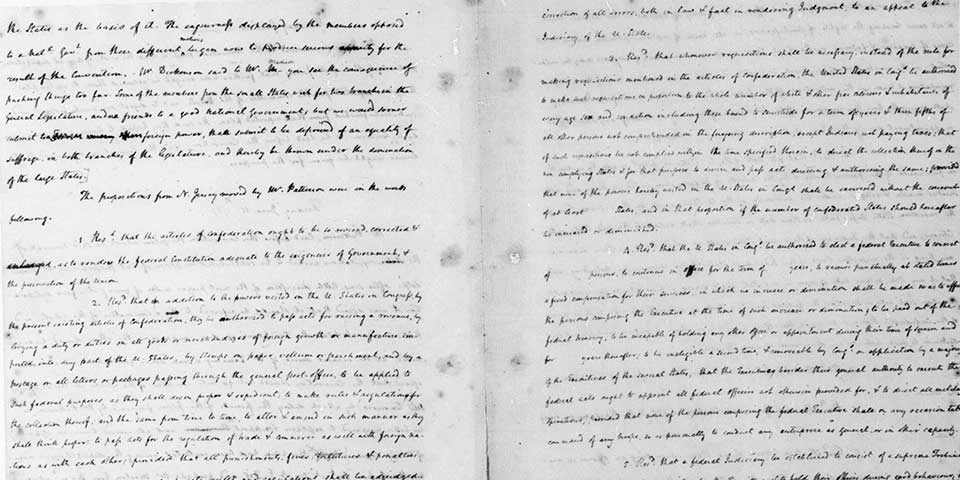Part of a series of articles titled The Constitutional Convention: A Day by Day Account for June 1787.
Article
June 15, 1787: The New Jersey Plan

Library of Congress, Manuscript/Mixed Material: https://www.loc.gov/item/mjm023093/.
"Mr. Patterson, pursuant to his intentions as mentioned yesterday, read a set of resolves as the basis of amendment to the confederation."
--Robert Yates in his Notes of the Secret Debates of the Federal Convention of 1787
Friday, June 15, 1787: The Convention Today
William Paterson introduced a plan now known as the The New Jersey Plan. Mr. Paterson's plan was designed to keep an equal vote in Congress for each state, an issue that would be fought over for the next month. The plan consisted of nine resolutions; as follows:
1. The Articles should be revised to make them "adequate to the exigencies of Government and the preservation of the Union."
2. The Confederation Congress should be authorized to raise money by taxing imports, by a stamp tax, and by postage, with tax evaders tried in state courts with appeal to a Federal judiciary.
3. Requests by Congress to the States for money over and above that raised by Federal taxes should by apportioned among the states based on free population plus 3/5 of slaves. If requisitions were not paid, a method of collecting from the delinquent states should be provided.
4. The Congress should be authorized to elect an executive [plural], to appoint all officers not otherwise provided for and to direct all military operations. The executive be removed on request of a majority of the state executive.
5. There should be a Federal judiciary, appointed by the Executive to hear and determine impeachments of Federal officers, and appeals in other cases.
6. All Acts of Congress made pursuant to the Articles of Confederation should be the supreme law of the land, with state judges bound to uphold them.
7. Provision should be made for the admission of new States into the Union.
8. There should be a uniform rule of naturalization.
9. Citizens of each state should be treated equally in state criminal courts.
Synopsis
Delegates Today
William Paterson introduced a plan now known as the The New Jersey Plan. Mr. Paterson's plan was designed to keep an equal vote in Congress for each state, an issue that would be fought over for the next month. The plan consisted of nine resolutions; as follows:
1. The Articles should be revised to make them "adequate to the exigencies of Government and the preservation of the Union."
2. The Confederation Congress should be authorized to raise money by taxing imports, by a stamp tax, and by postage, with tax evaders tried in state courts with appeal to a Federal judiciary.
3. Requests by Congress to the States for money over and above that raised by Federal taxes should by apportioned among the states based on free population plus 3/5 of slaves. If requisitions were not paid, a method of collecting from the delinquent states should be provided.
4. The Congress should be authorized to elect an executive [plural], to appoint all officers not otherwise provided for and to direct all military operations. The executive be removed on request of a majority of the state executive.
5. There should be a Federal judiciary, appointed by the Executive to hear and determine impeachments of Federal officers, and appeals in other cases.
6. All Acts of Congress made pursuant to the Articles of Confederation should be the supreme law of the land, with state judges bound to uphold them.
7. Provision should be made for the admission of new States into the Union.
8. There should be a uniform rule of naturalization.
9. Citizens of each state should be treated equally in state criminal courts.
Synopsis
- Wiliam Paterson (NJ) submitted a plan with nine resolutions designed to keep an equal vote in Congress for each state
Delegates Today
- Dr. Johnson (CT) again dined "at home" (City Tavern), and walked around looking for less expensive lodgings. His expenses for the day were seven shillings and six pence.
- General Washington (VA) dined and drank tea at Mayor Powel's.
- The Street Commissioners met, all six members present, and paid for building stone,
- carpenters work for the sewer building in Fourth Street, and for "building a double stack of chimneys for negro Cato, in Filbert Street near Ninth Street."
Last updated: September 24, 2019
